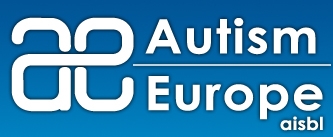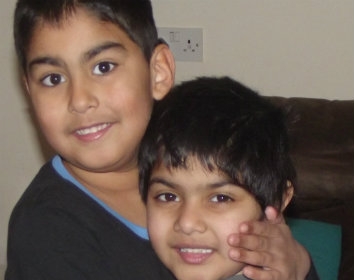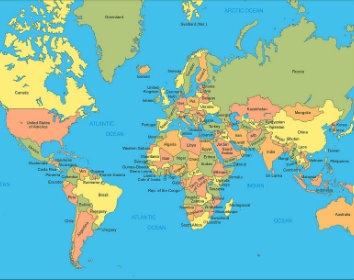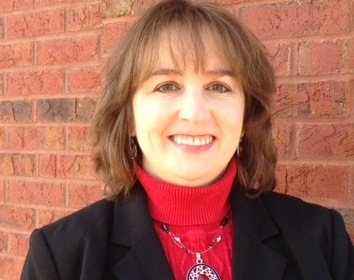Technology and I
Jamie + Lion, Senior Accessibility Specialist, BBC
This article, is about the how I live my life and how technology underpins everything I do. But first, a timeline.
Eighteen months ago I was just about to get the job of my dreams after 2 years struggling through a difficult job. I lived with my boyfriend in Harrow, London. He looked after me while he studied and I paid the bills.
Twelve months ago I was sleeping in a bath of hot water most nights as that was the only effective pain-relief for the extreme pain I was feeling lots of the time. My boyfriend had left, my friends were looking after me as best they could.
Six months ago, I had an operation. A surgeon removed the gallbladder causing pain equivalent to childbirth and I believed I would “return to normal”.
That is not what happened.
Masks are Dangerous
I got ill because I was taught that appearing normal was more important than being happy or myself. Any time I was “more normal” it was seen as an achievement. It was made clear to me, autistic things were bad. The end result is I pushed myself too hard for too long.
Luckily, my friends (who saw me at my most spaced out and autistic) didn’t mind. They liked both sides of me.
I was open about being autistic, but I didn’t really accept it. I thought of it as something I could “beat” with enough effort.
In the interest of appearing normal I exhausted myself and hit burn out. So much so, rather than fix everything, the operation just triggered a collapse and loss of skills.
After my operation, my “bad day” became my everyday. My mask was gone. I lost everything from speech to toileting and the ability to go outside alone.
I needed way more support than I could access at my home on the other side of London. The only option was for me to move and a week later, I had a new home close to my friends’ house. I was going to try and live independently.
Independence and Autonomy
I use to think independence meant “doing everything myself” but I quickly learned if I wanted to stay working I needed to focus my energy there.
Independence does not mean “doing everything myself”, independence is more nuanced, to me it really means gaining autonomy.
Autonomy means I captain the ship and set the direction, the speed and the destinations. For example, autonomy is more about being able to make decisions and change things I am unhappy with, than being able to do every task myself.
I tried doing everything myself, and that didn’t work. So I now focus on using my energy to do the important things (maintain a job, recover speech, etc) and I accept help for everything else.
However, to do this I must be able to communicate.
Talking Apps
I can think of words, but most of the time I cannot say them. They just won’t come out and the harder I force it, the less they come. I get some words, the words which fall out. I have 5 common ones. Washing Machine, Crumbs, Cake and Calgon, but they rarely make for deep conversations.
I needed a way to communicate.
Luckily, loosing my speech from time to time has happened to me since I was a kid. So I already had the Porloquo4text app installed on my phone.
It converts what I type into spoken words for others to hear.
This technology is instrumental to my life. Not just in the form of communication but also confidence. I struggle with anxiety, and loosing my speech entirely had made it worse.
Knowing I have a voice in my pocket if it is needed gives me the confidence to leave my flat alone. I don’t walk far, I have just two short walks everyday, but that’s 100% more than I could manage 6 months ago.
Communication is an essential starting point. Next comes finding and using appropriate support.
Meet the Babysitter
Six months ago, we quickly understood that I’d need more support than my friends could provide.
In theory social services should have helped, but in reality, they have spent 6 months denying my needs and generally being unhelpful. In the end, I borrowed money from friends to fund my care, selling my home to repay them.
Finding care is really difficult, most care agencies won’t reply to emails, disclose pricing or give any indication of their experience with autism.
In the end, I used a website aimed at parents looking for babysitters! The website (findababysitter.com) allowed me to post a “job” and then see who replied.
In the job advert I explained the situation and my needs and I had about a dozen replies. This is the second time I have successfully found support via the babysitter website.
We got extremely lucky, a member of staff from one of the special schools replied and offered to help. She is an expert in autism having spent 20 years helping autistic people of all ages.
She’s turned out to be an amazing person. Her experience has proved invaluable and with her support I am making good progress.
The way we do it is not typical. On purpose, she does not “support” me when she visits in the evening. She looks after me. This is all facilitated with technology.
When she arrives she writes a schedule on a whiteboard and sends me a photo. I am extremely shy with others in my home, so I tend to hide in my bedroom all evening. When I get the photo, I agree the schedule. That’s the handover. From that point on I have agreed for her to take control a bit and guide me through the evening routine.
The same messaging technology I use with the babysitter, I also use with my friends, who maintain a chat room dedicated to supporting me. I always have somewhere where I can ask questions or call for help.
This all acts as a foundation so I can work and contribute to the world.
Employment
Technology is not just a tool, it’s also my job. I work for the BBC where I have an amazing line manager who has really helped me to understand “disability” and acceptance.
My job at the BBC is to work with digital teams to ensure our apps and websites work for everyone. I have code on almost every BBC page and am involved with all the major projects from iPlayer to Cbeebies. I’ve even had my code run on the International Space Station.
Technology enables me to work, I work remotely 4 days a week using email, Slack and other text based tools.
Technology fits my strengths. I find building websites or designing gearboxes much easier than crossing roads. Roads are unpredictable, high risk and fast. Code just does exactly what I tell it to do (even if I didn’t mean it).
The Future
I am learning that to accept the autism I must accept that it sets boundaries; but a boundary is not the same as a limit.
Using technology I have started to develop a support network which is capable, robust and sustainable. There is still much to do but this time around I am
working with my autism and not trying to “defeat it”. I no longer see “passing for” neurotypical as a sensible or productive aim.
Technology underpins all of what I do. Without it I would have no employment or support, no friends and no communication. Technology empowers me and breathes autonomy into my life.





